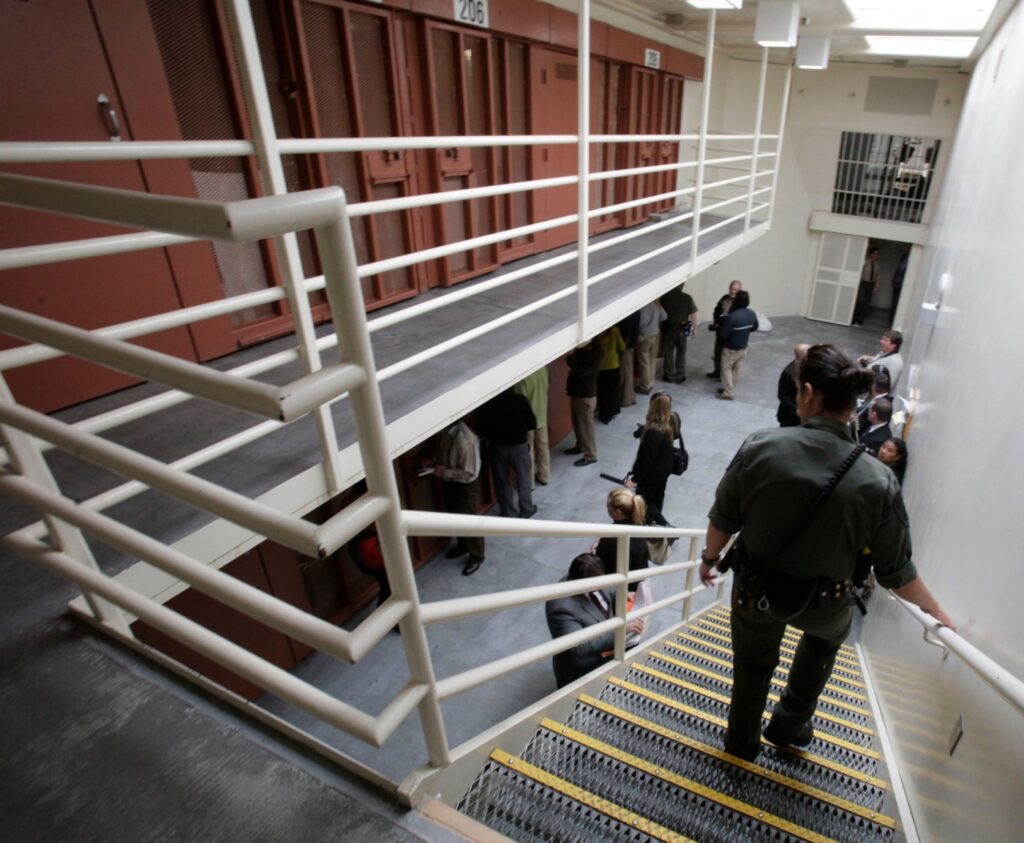
As Gov. Gavin Newsom considers signing the Mandela Act to limit solitary confinement in California, he needs to understand its true horrors.
Today I write this as a rising immigration attorney and legal fellow with national advocacy organization Robert F. Kennedy Human Rights. But just four short years ago, I was an asylum seeker from Cameroon, locked in five different immigration detention centers in California awaiting my hearing date in an immigration court. In the nine months that I was detained, I witnessed fellow immigrants sent to solitary confinement–some for no reason that I or others could discern. My experience in detention and working with clients who have been locked in solitary confinement is an emotionally difficult one for me to revisit, but I feel compelled to share it in the hopes of saving others from the same.
Three and a half years ago still seems like yesterday, in many ways. In April 2019, at around 3:00 am, guards woke me in my cell at the Theo Lacy Maximum Security Jail in Santa Ana California to prepare me to travel to my immigration court hearing. I was detained in the barracks, where the constant sounds of screaming, banging and crying echoed in the air. But as we walked past the Special Housing Units where people were held in solitary confinement. I realized that I was better off than them. Hearing human beings bang against the doors of solitary confinement, seeing desperate eyes through tiny square holes, I shuddered.
There is no court proceeding before you are put into the “hole.” Instead, a prison official simply dictates this punishment at will. Once you are confined in solitary, there is no oversight of your treatment, nor recourse for release. Your time there could even be indefinite, and can depend on the color of your skin. Black immigrants like myself are more than six times more likely to be held in solitary confinement compared to other immigrants.
Between state and federal prisons and local jails, about 2.3 million people were incarcerated in the United States in 2019, according to the Census of State and Federal Adult Correctional Facilities. That same year, an estimated 55,000 to 62,500 people had spent the previous 15 days in solitary confinement in state and federal prisons, including immigration detention facilities, often in cells smaller than a parking space.
AB 2632, commonly known as the California Mandela Act, is part of a nationwide push to curb widespread use of solitary confinement. It would prohibit the practice for pregnant women, those younger than 26, those older than 59, and people with certain disabilities or mental health disorders.
For others, stretches in solitary would be limited to 15 consecutive days and 45 days in any 180-day period. Periodic check-ins and out of cell programming would be required.
California’s bill comes after at least 10 other states have also limited or banned punitive segregation.
Some corrections officials continue to argue that such rollbacks will make prisons and jails less safe. But reforms to solitary confinement in other states have not resulted in more dangerous prisons. They have not stopped the torture of confining a human begin to a tiny cell for 23 hours a day.
Since my release from immigration detention, I have worked to ensure that people targeted by both the immigration and criminal legal systems are protected from abuse. As the manager of the Black Immigrants Bail Fund Project and a legal fellow at RFK Human Rights, I now have the ability to help people held in immigration detention simply because they can’t afford to pay bail. Through this work, I have assisted over 200 immigrants held in detention centers across California, and visited immigration detention centers throughout the United States. Time and again I have witnessed and listened to stories of brutality, arbitrary punishment from guards, and inhumane living conditions. And the traumatic effects of solitary confinement are especially dire, with long-lasting effects that are 90 percent more severe than that of ordinary detention. In light of this, the United Nations Special Rapporteur on Torture has declared that there should be an absolute prohibition on solitary confinement in excess of 15 days.
Related Articles
Trump’s declassification claims are implausible and irrelevant
There’s a difference between defending free markets and being ‘pro-business’
Endorsement: Michelle Steel for 45th congressional district
AB 257 abridges business freedoms in California
California puts lipstick on its porcine IT project
We often wait to talk about racial justice until confronted with an image of sensational horror like the video of George Floyd’s murder, or another viral picture of a Black person experiencing police brutality, such as Nebane Abienwi, an immigrant who died in Otay Mesa Detention Center in San Diego.
We don’t have these images of solitary confinement because it occurs in dark and isolated cells, cut off from cameras that can record the suffering taking place. But it shouldn’t take a photograph to burn such an image into Newsom’s mind. Tens of thousands of us already carry this trauma every day, trauma we’ve suffered alone.
It’s time to sign the Mandela Act and to end torture in California prisons and detention centers.
Daniel Tse is a Legal Fellow at RFK Human Rights where he works on advocacy, research, policy reform and other strategic support for Black immigrant communities in the United States.
